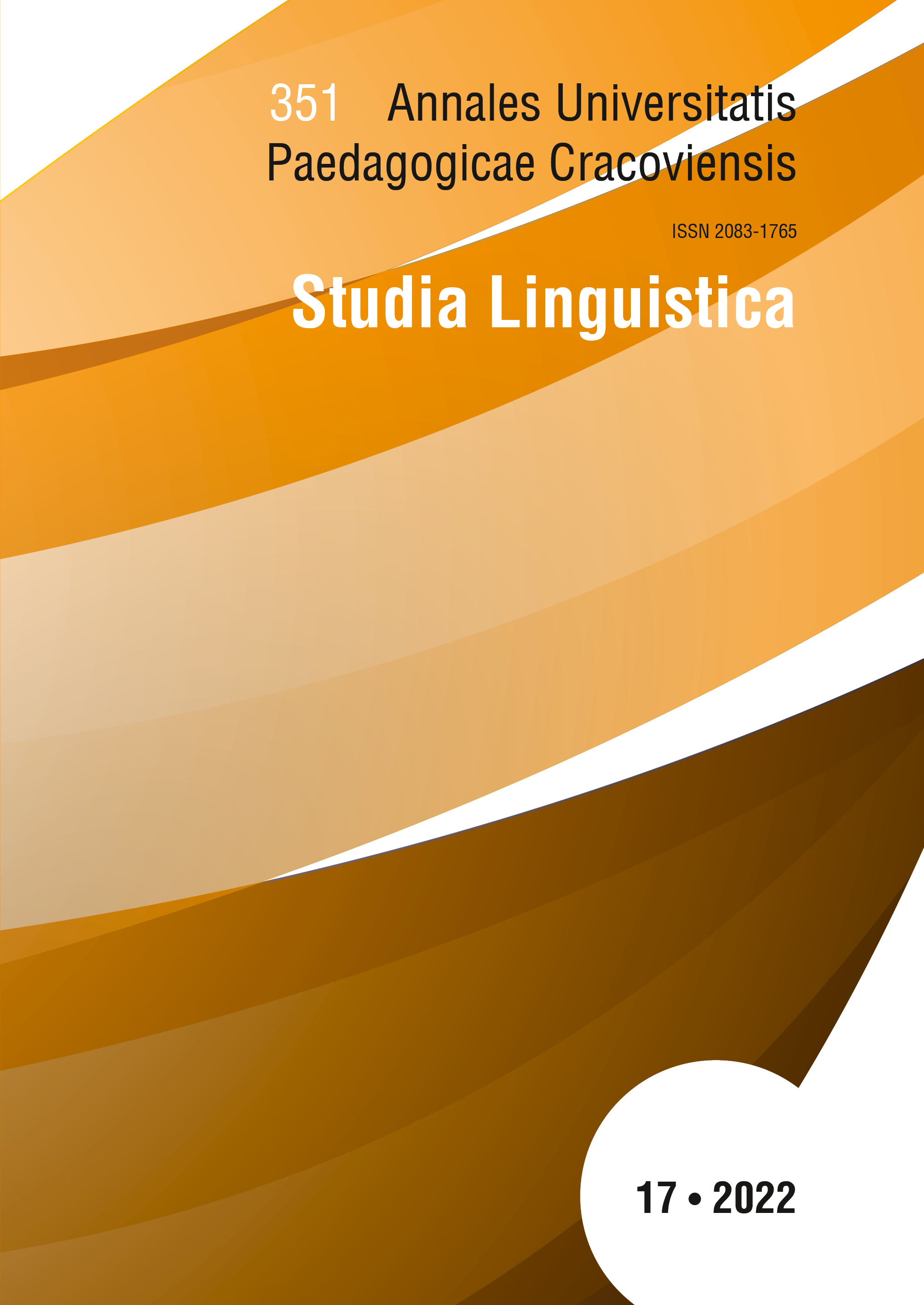Latin in Polish or interlinear gloss on the unfortunate “warunek sine qua non” hybrid
Main Article Content
Abstract
This draft is dedicated to the warunek sine qua non expression, which is pervasive in modern Polish language (both in scientific and sensu largo journalistic sources). The draft’s author explains in detail the mechanism of error of this popular lingual hybrid and reflects on the causes for the several decade-long popularity of this structure, notabene sanctionaed in normative linguistic compendiums, as well as numerous lexicons and dictionaries. The issue of this unfortunate error in this case has been silhouetted against the issue of awareness on proper and subtle use of Latin expressions, phrases, and idioms in scientific dissertations and media publications. This issue is extremely important in modern culture and fades in a terrifyingly fast manner.
Downloads
Article Details

This work is licensed under a Creative Commons Attribution-NonCommercial-NoDerivatives 4.0 International License.
Author, submitting a text to the editorial board of the journal “Annales Universitatis Paedagogicae Cracoviensis. Studia Linguistica", certifies that the content of the article has not been published so far and that the work does not violate in any way the copyright or related rights of other person, as well as other rights of third parties, and that no one's rights to the work (or any part thereof) have been missed. After signing the contract, the property rights to the published materials are transferred to the University of the National Education Commission, Krakow.
“Annales Universitatis Paedagogicae Cracoviensis. Studia Linguistica” is an open access journal, and all its content is made available free of charge to users and institutions under the Creative Commons CC-BY-NC-ND 4.0 license (attribution, non-commercial use, no derivative works). Under this license, the authors agree that their work may be lawfully reused for any purpose, except for commercial purposes, without the prior consent of the author or publisher. Everyone can read, download, copy, print, distribute and process these works, provided that the author's marking and the original publication place are correct. Published texts may not be used to create derivative works (e.g. to translate and publish in another language without the consent of the publisher). This is in line with the BOAI (Budapest Open Access Initiative) definition. "Studia Linguistica" does not charge for submitting or processing articles.
References
Bańko M. (red.), 2003, Wielki słownik wyrazów obcych PWN, Warszawa.
Google Scholar
Bobiatyński L., 2003, Wprowadzenie do antyku a nauczanie języków klasycznych: ze szczególnym uwzględnieniem metody M. Goliasa „Collectanea Philologica” 5, s. 207–220.
Google Scholar
Bobrowski F., 1841–1844, Słownik łacińsko-polski, Wilno, t. I–II.
Google Scholar
Buttler D., 1989, Dola i niedola wyrazów pochodzenia łacińskiego we współczesnej polszczyźnie, „Poradnik Językowy”, nr 3, s. 202–205.
Google Scholar
Czapiński L., 1892, Księga przysłów, sentencji i wyrazów łacińskich używanych przez pisarzów polskich, Warszawa.
Google Scholar
Drabik L., 2021 (oprac.), Słownik wyrazów obcych PWN z przykładami i poradami, Warszawa.
Google Scholar
Dyczkowski J. (red.), 1998, Nowy leksykon PWN, Warszawa.
Google Scholar
Gorzkowski A., 2007, Nauczyć słuchać, czyli czym jest naprawdę filologia?, [w:] Rzeczy minionych pamięć. Studia dedykowane Profesorowi Tadeuszowi Ulewiczowi w 90. rocznicę urodzin, red. A. Borowski i J. Niedźwiedź, Kraków, s. 221–228.
Google Scholar
Jędraszko C., 1970, Łacina na co dzień, Warszawa.
Google Scholar
Jodkowski K., 2005, Filozofia przyrody jako warunek sine qua non powstania i rozwoju nauki, „Roczniki Filozoficzne” 53, nr 2, s. 424–427.
Google Scholar
Kopaliński W., 2021, Słownik wyrazów obcych i zwrotów obcojęzycznych z almanachem, Warszawa.
Google Scholar
Korpanty J. (red)., 2001, Słownik łacińsko-polski, Warszawa, t. I–II.
Google Scholar
Landowski Z., Woś K., 2002, Słownik cytatów łacińskich. Wyrażenia – sentencje – przysłowia, Kraków.
Google Scholar
Markowski A., Pawelec R. (red.), 2007, Popularny słownik wyrazów obcych i trudnych, Warszawa.
Google Scholar
Mączyński J., 1564, Lexicon Latino-Polonicum ex optimis Latinae linguae scriptoribus concinnatum, Regiomonti.
Google Scholar
Melzak Z., 1995, Jak łacina uratowała mi życie. Wartość wykształcenia klasycznego, „Meander” 50, z. 3–4, s. 177–189.
Google Scholar
Plezia M. (red.), 2007, Słownik łacińsko-polski, wyd. 2, t. I–V, Warszawa.
Google Scholar
Rysiewicz Z., Safarewicz J. (red.), 1959, Słownik wyrazów obcych, Warszawa. Thesaurus linguae Latinae, 1906–1909, vol. 4, Lipsiae.
Google Scholar
Wesołowska E., 2016, Wstęp, [w:] W. Stroh, Łacina umarła, niech żyje łacina! Mała historia wielkiego języka, tłum. A. Arndt, Poznań, s. 11–21.
Google Scholar
Węclewski Z., 1851, Słownik łacińsko-polski do autorów klasycznych, Poznań.
Google Scholar
Wielka encyklopedia PWN, 2001–2005, Warszawa, t. 6.
Google Scholar
Mańkowski J., Conditio czy condicio?, 2003 [Poradnia Językowa PWN], https://sjp.pwn.pl/poradnia/haslo/conditio-czy-condicio;4094.html (dostęp 12.03.2022).
Google Scholar
Mussomeli Ch., 2009, Condicio o conditio sine qua non?, https://accademiadellacrusca.it/it/consulenza/condicio-o-conditio-sine-qua-non/253 (dostęp 12.03.2022).
Google Scholar
Osiński I., 2020, Procedury – warunek sine qua non! [blog], http://ireneuszosinski.pl/procedury-warunek-sine-qua-non/ (dostęp 12.03.2022).
Google Scholar
